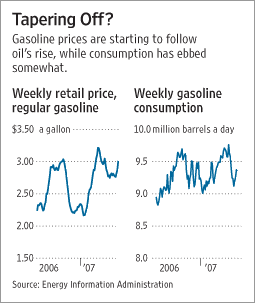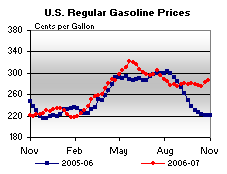Gasoline has trailed oil's rise to nearly $100 a barrel, but fuel prices now look poised to take off.
Oil climbed $2.72 to $96.70 a barrel in New York Mercantile Exchange trading, bringing it closer to an inflation-adjusted high of $101.70 reached in April 1980. The sharp rise and an extended period of high prices has sent heating oil to new highs. (Please see related article.)
Gasoline is now expected to follow, potentially taking money out of the pockets of consumers at a time of weakening growth in consumer spending.
The average price of regular gasoline was $3.02 a gallon, according to AAA, formerly the American Automobile Association. That was up from $2.77 last month and from $2.20 a gallon a year ago. "Unfortunately between now and the end of the year gasoline prices will continue to rise if oil stays above $95 a barrel, and certainly if it goes above $100 a barrel," says Geoff Sundstrom, spokesman for the AAA.
The article also has the following chart:

Here's another chart of gasoline prices from This Week in Petroleum.

Notice that gas prices are usually seasonal, rising in the summer as demand picks up and dropping in the fall as demand falls. However, thanks to record high oil prices, that pattern isn't occurring this year (at least so far). As a result:
Anxious retailers are already clamoring to outdo each other with bigger and better Black Friday-like deals, threatening to make Black Friday itself a non-event this year.
"Black Friday this year may show some signs of vulnerability if retailers keep promoting to the extent that they already are," said Marshal Cohen, chief retail industry analyst with market research firm NPD Group.
Wal-Mart (Charts, Fortune 500), the world's largest retailer, isn't waiting to jumpstart its holiday sales.
Wal-Mart already treated its shoppers to an appetizer of its holiday blockbuster deals this past weekend, which included a 14-inch Acer LCD-screen laptop for $348 and a Sanyo 50-inch plasma HDTV for $998.
.....
Toys "R" Us shipped its annual holiday discount catalog late last month. Wal-Mart's rival Target (Charts, Fortune 500) rolled out it's holiday ad insert this past weekend.
Department store chain J.C. Penney (Charts, Fortune 500) currently is touting "The biggest sales of them all!" at its stores, offering its shoppers 20 to 60 percent off on clothes and home-related goods.
Also this week, Penney's rival Kohl's (Charts, Fortune 500) has cut prices by as much as 40 percent on sweaters, 50 percent on footwear and 60 percent on jewelry.
Among specialty sellers, both American Eagle Outfitters and Aeropostale (Charts) set 50 to 60 percent discounts on jeans and sweatshirts.
A few points need mentioning.
1.) Oil prices are extremely volatile right now. One of the primary reasons for oil's increase is the situation along Northern Iraq with Turkey. If this situation resolves peaceably then a large stimulus for oil's increase will be gone and traders will probably take profits. In other words, oil's price increase is extremely fluid.
2.) Counting out the US consumer is a very bad idea. Americans love to shop and usually find a way to do so, regardless of how. So don't bet against them yet.
3.) The housing market has been in turmoil for about a year now. At this time last year, we were getting the first signs of problems in the mortgage market. But the story really wasn't that important than. Now we've had a year of dropping home prices, huge write downs at various Wall Street Firms, a big summer stock market correction caused by mortgage related problems and two interest rate cuts. Another way to put this is the housing market story has been in the news prominently for about a year and none of the news has been good. This has had a definite impact on consumer sentiment, which is at it's lowest level since May 2006. So the overall consumer sentiment environment has definitely changed for the worse over the last year.
Retailers are concerned enough to start lowering prices and offering incentives. And traders are selling department store shares, indicating they are concerned enough to drop retail positions.
It's shaping up to be a very difficult Christmas shopping season.